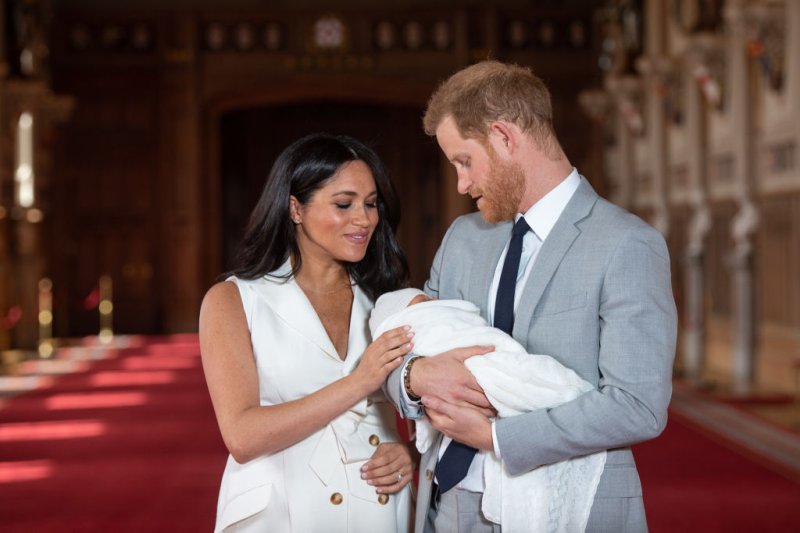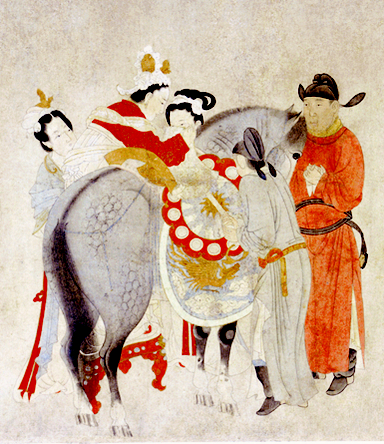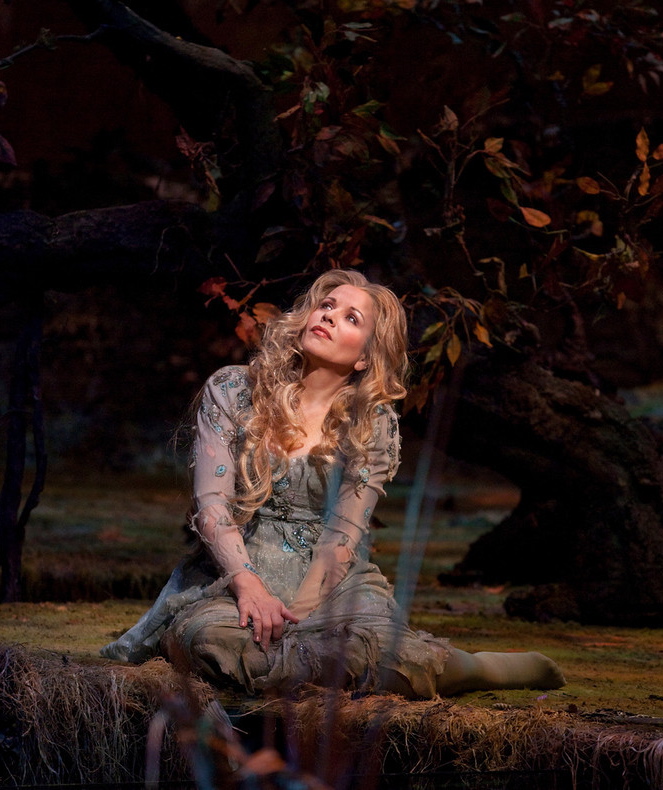Megxit: Unhappy Operatic Princesses
 |
| Meghan, Harry and Baby Archie |
My only thought: could Meghan have been watching some opera? Because opera is filled with women who marry into royalty, realize that it isn't all that and a bag of chips and are so unhappy there's an entire opera about it. Let's examine some unhappy royal princesses and how their situation might or might not have parallels with Meghan:
 |
| Anne Boleyn |
Possible parallels with Meghan: Meghan was considered an unorthodox choice to marry into the British Royal Family -- divorced, biracial, an American actress. Anne was an even more shocking choice: Henry was married to the Catholic, loving, long-suffering Catherine of Aragon, who endured escalating, cruel treatment after she refused to grant Henry VIII a divorce. Anne was a woman of the world. The affair between Anne and Henry was the subject of salacious gossip in the Tudor era. It caused such a scandal that Henry had to create a whole new church.
Accusations against Anne sound familiar with DailyMail screeds against Meghan: social climber, the wrong skin color (Anne was considered "swarthy" and said to have six fingers, while a radio host got fired for comparing baby Archie to a chimpanzee), too eager to "break royal protocol." "Megain" and "Manghan" are two of the printable nicknames floated around about Meghan.
 |
| Catherine of Aragon |
How historically accurate is the opera? By operatic standards, pretty accurate. Eric Ives has an excellent biography of Anne that I refer to as the "Anne Boleyn Bible." And what he writes squares up pretty well with the libretto. There are inaccuracies. For instance the opera doesn't mention that one of the charges lobbed towards Anne was that she committed incest with her brother George and both George and Anne were executed. In the opera has Anne and Jane Seymour sing a conciliatory duet together. In real life the two women loathed each other.
The libretto by Felice Romani and music by Donizetti captures Anne's fiery personality and Henry's hatred and coldness towards Anne after she failed to produce a male heir. Consider Anne's final letter to Henry:
Sir,
Your Grace's displeasure, and my imprisonment are things so strange unto me, as what to write, or what to excuse, I am altogether ignorant. Whereas you send unto me (willing me to confess a truth, and so obtain your favour) by such an one, whom you know to be my ancient professed enemy. I no sooner received this message by him, than I rightly conceived your meaning; and if, as you say, confessing a truth indeed may procure my safety, I shall with all willingness and duty perform your demand.
But let not your Grace ever imagine, that your poor wife will ever be brought to acknowledge a fault, where not so much as a thought thereof preceded. And to speak a truth, never prince had wife more loyal in all duty, and in all true affection, than you have ever found in Anne Boleyn: with which name and place I could willingly have contented myself, if God and your Grace's pleasure had been so pleased. Neither did I at any time so far forget myself in my exaltation or received Queenship, but that I always looked for such an alteration as I now find; for the ground of my preferment being on no surer foundation than your Grace's fancy, the least alteration I knew was fit and sufficient to draw that fancy to some other object. You have chosen me, from a low estate, to be your Queen and companion, far beyond my desert or desire. If then you found me worthy of such honour, good your Grace let not any light fancy, or bad council of mine enemies, withdraw your princely favour from me; neither let that stain, that unworthy stain, of a disloyal heart toward your good grace, ever cast so foul a blot on your most dutiful wife, and the infant-princess your daughter. Try me, good king, but let me have a lawful trial, and let not my sworn enemies sit as my accusers and judges; yea let me receive an open trial, for my truth shall fear no open flame; then shall you see either my innocence cleared, your suspicion and conscience satisfied, the ignominy and slander of the world stopped, or my guilt openly declared. So that whatsoever God or you may determine of me, your grace may be freed of an open censure, and mine offense being so lawfully proved, your grace is at liberty, both before God and man, not only to execute worthy punishment on me as an unlawful wife, but to follow your affection, already settled on that party, for whose sake I am now as I am, whose name I could some good while since have pointed unto, your Grace being not ignorant of my suspicion therein. But if you have already determined of me, and that not only my death, but an infamous slander must bring you the enjoying of your desired happiness; then I desire of God, that he will pardon your great sin therein, and likewise mine enemies, the instruments thereof, and that he will not call you to a strict account of your unprincely and cruel usage of me, at his general judgment-seat, where both you and myself must shortly appear, and in whose judgment I doubt not (whatsoever the world may think of me) mine innocence shall be openly known, and sufficiently cleared. My last and only request shall be, that myself may only bear the burden of your Grace's displeasure, and that it may not touch the innocent souls of those poor gentlemen, who (as I understand) are likewise in strait imprisonment for my sake. If ever I found favour in your sight, if ever the name of Anne Boleyn hath been pleasing in your ears, then let me obtain this request, and I will so leave to trouble your Grace any further, with mine earnest prayers to the Trinity to have your Grace in his good keeping, and to direct you in all your actions. From my doleful prison in the Tower, this sixth of May;
Your most loyal and ever faithful wife, Anne Boleyn
 |
| Callas as Anna Bolena |
In the opera Anna's final aria is "Coppia iniqua." The lyrics capture the spirit of the letter, albeit without Anne's stinging wit. "Wicked couple" sounds very much like something Anne might have said about Henry and Jane Seymour.
Moreover, Donizetti's music is fiery and angry. The ascending trilling scales in "Coppia iniqua" echo Anne's increasing rage. When sung by someone like Maria Callas one can practically hear Anne spitting about Henry's "unprincely and cruel usage."
 |
| Elisabeth of Valois |
Possible parallels with Meghan: Elisabeth of Valois moved from her homeland at the tender age of sixteen to live in Spain. In the opera Elizabeth sings of her homesickness: "France, noble country, so dear to my young age!" Meghan also abandoned her entire life and friends in the States and Canada and moved to England to marry Harry. She even left behind her dog. Rumors in the press were that she was homesick and lonely, and her decision to move back to Canada seems to confirm the feeling that she never felt at home in England.
How historically accurate is the opera? Totally inaccurate. The opera is based on a play by Friedrich Schiller and has little historical basis. Elisabeth was betrothed to Carlos and ended up marrying Philip II. However the marriage between Elisabeth and Philip was considered a happy one by royal standards. In the opera Philip cheats on Elisabeth with Princess Eboli. In real life Philip for all his faults as a ruler and father (he ended up putting his son Carlos under house arrest) was a rarity among kings -- a faithful husband. He cared for Elisabeth when Elisabeth fell ill with smallpox and the royal couple doted on their two daughters.
Elisabeth was fond of Carlos but as Carlos was sickly, physically deformed and mentally unstable, the attachment was more brother-and-sister than romantic. The opera is more accurate in depicting the cold relationship between Philip and Carlos.
Still, one can imagine Meghan sitting in Frogmore Cottage and singing something like this:
 |
| Yang Gufei |
Possible parallels with Meghan: Rumors have swirled in the press about Meghan's antagonistic relationship with royal staff. In The Drunken Concubine Lady Yang also grows increasingly frustrated with the eunuchs as they stall and make excuses for the no-show Emperor. She eventually slaps one of them in the face. Lady Yang is portrayed as a sad but headstrong character who is not afraid to offend.
How accurate is the opera? Difficult to know as The Drunken Concubine is more of a character study than a historical opera. In real life Lady Yang had the kind of life that begged for operatic treatment. She became the chief concubine of Tang Dynasty Emperor Ming-Huang. I'll just let this Encyclopedia Brittanica article speak for itself:
The daughter of a high official, she was one of the few obese women in Chinese history to have been considered beautiful. She became a concubine to Xuanzong’s son, but the 60-year-old emperor found the girl so desirable that he forced his son to relinquish her. Soon her two sisters were admitted into the imperial harem, and her cousin Yang Guozhong became the first minister of the empire.
Through Yang’s influence, An Lushan, a cunning young general of Turkish origin, rose to great prominence. Yang adopted him as her legal son and is said to have made him her lover. With such powerful patronage, An Lushan came to control an army of 200,000. He was jealous of the power of Yang Guozhong and soon turned against the emperor, leading a great uprising (the An Lushan rebellion) against him. When the capital was captured in 756, Xuanzong and his court were forced to flee to the south. On the road the imperial soldiers became enraged with members of the Yang family, whom they blamed for the debacle, and executed both Yang and her cousin.Here is legendary Peking opera star Mei Lang Fang singing The Drunken Concubine:
 |
| Renée Fleming as Rusalka |
Meghan was a total outsider and if reports are to believed simply couldn't integrate into the Royal Family. She gave up her popular blog "The Tig" and deleted all her social media to move to England and be with Harry. She tried being dignified, glamorous and apolitical. The Sussexes announcement hinted that this sort of role was not satisfactory for them: "After many months of reflection and internal discussions, we have chosen to make a transition this year in starting to carve out a progressive new role within this institution."
In Rusalka the Prince betrays Rusalka for a foreign princess. Rusalka is eternally damned to become an agent of death. Rusalka gives the Prince his Kiss of Death, then retreats back to into the waters forever. Dvořák's breathtakingly beautiful music captures the emptiness and sadness that is Rusalka's fate.
Whether you like her, dislike her, or don't care, let's hope Meghan ends up happier.
Here is Renée Fleming's luminous Song to the Moon:
Here is the full SussexRoyal annoucement:


"while a BBC reporter got fired for comparing Meghan to a chimpanzee"
ReplyDeleteDanny Baker is not a BBC reporter, and didn't compare Meghan to a chimpanzee: he posted an old photo of a smartly-dressed couple taking a chimpanzee for a walk, along with a comment about the Sussexes taking their new baby home, and later claimed that he had been unaware of Meghan's mixed-race heritage.
Ok i fixed it. He compared Archie to a chimpanzee which is even worse. There's no way he was unaware of Meghan's mixed race heritage. Comparing people of color to apes is one of the most classic racist tropes.
DeleteThe racism toward Meghan in this day and age is truly sad and horrifying.
ReplyDeleteAgree. The British tabloids like Daily Mail are the worst.
DeleteI'm late to the party, but I found this super fun. Glad I read it, even months after the fact.
ReplyDeleteAnd, because I can't let this one go--a reporter (WHO IS A F*CKING BBC REPORTER and KNOWS WHO MEGHAN IS BECAUSE IT's HIS JOB) showed Archie as a chimp but it's all jolly, chaps, because the chimp was "smartly dressed"? Just...wow.
And because, not that it's really any of our business, but if any of us married into a family, had a baby, and then found out that the baby's grand uncle attended parties hosted by a rapist pedophile and the family's reaction was "Oh nooooo," and the public's reaction was "Oh nooooo..." then yeah, you'd leave that family too and you'd certainly resign you post of being ambassador to the 'brand.'
Operatic, indeed.